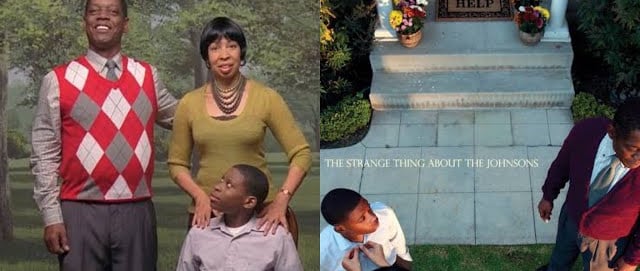Exploring the Dark Depths: A Critical Analysis of Ari Aster’s 'The Strange Thing About the Johnsons'
The Strange Thing About the Johnsons, Ari Aster’s 2011 short film, flips the horror genre inside out, revealing a family secret so taboo it feels physically suffocating. Beneath the surface of suburban calm lies a disturbing tale of paternal abuse—not from father to son, but the reverse. The film explores incest, manipulation, and denial with an unflinching, suffocating tension that gnaws at the viewer’s sanity. It's not horror in the traditional sense, but psychological violation at its purest. Every smile is a mask, every silence a scream. This is not just a film—it’s a descent into domestic hell. Viewer discretion is essential.
NSFWABYASSMOVIE REVIEW
8/2/20258 min read


The Strange Thing About the Johnsons A Reversal of Flesh: Where Son Becomes Sin and Father Becomes Prey
There are films that disturb you. And then there are films that redefine the meaning of horror—not by showing you monsters, but by revealing that the monsters live in the family portrait, framed, smiling, dusted every week. Ari Aster’s The Strange Thing About the Johnsons is not just a short film—it’s a crucifixion in 29 minutes. An autopsy of family. An incestuous apocalypse where innocence is the first casualty and silence is the weapon. The movie opens with a teenage boy, Isaiah Johnson, masturbating to a photo of his father, Sidney. That sentence alone should be enough to sever breath. But Aster doesn't let you escape. The moment is soft-lit, suburban, quiet. Sidney stumbles in, stammers through fatherly embarrassment, trying to comfort his son with the typical awkward speech. He doesn't realize—he can’t realize—what Isaiah was doing. But we do. And from that moment, the floor beneath the audience crumbles. Because this isn’t just about a broken boundary. It’s about a complete inversion of roles. Isaiah, the son, is the abuser. Sidney, the father, is the victim. And the mother, Joan, is the silent accomplice—her denial so loud it drowns out every scream that never comes. The Johnsons are a family wrapped in politeness, trapped in ritual, and bleeding internally.
Ari Aster’s 2011 short film, 'The Strange Thing About the Johnsons,' has garnered attention for its unconventional approach to the horror genre. Unlike traditional horror narratives that rely on external monsters or supernatural elements, Aster delves deep into the unsettling dynamics of a suburban family, revealing a shocking secret that challenges societal norms and expectations. This film does not merely entertain; it unleashes a psychological storm that compels viewers to confront uncomfortable truths about family dynamics and the nature of abuse.
The Oedipus Complex Inverted: Freud in Flames
Sigmund Freud would have been appalled—and yet fascinated—by The Strange Thing About the Johnsons. At its core, the Oedipus complex refers to a child's unconscious desire to possess the opposite-sex parent and eliminate the same-sex rival. But Isaiah doesn't follow that script. He doesn't want his mother. He doesn't want to kill his father—he wants to own him. What Aster does is take Freud’s theory and invert it, mutilate it, and set it aflame. Isaiah is both the son and the seducer. The abuser and the inheritor. The child who refuses to grow up in any healthy sense, instead weaponizing his position as “the baby of the house” to control and dominate. The family structure is shattered. There is no hierarchy. The son has dethroned the father—not by rebellion, but by rape. This is the Oedipus complex without metaphor. This is the son returning to the source, not for comfort, but conquest. And the father is not a god-figure to slay, but a weak, trembling thing to keep chained. The House That Was a Tomb The Johnsons’ home is immaculate. Bright walls, framed photos, laughter, tea parties. It all feels dead. Every corner of the house is soaked in spiritual mildew. It’s not a home—it’s a crime scene with a working kitchen. The film is a slow bleed from warm to cold. From fatherly stutters to suicidal silence. From a wedding toast to a tear-soaked confession. Sidney’s memoir—a desperate attempt to tell the truth—is his final act of rebellion. But it doesn't save him. The abuse doesn't stop. And the truth doesn’t win. It never wins in houses like this. That’s the real horror. Not just that Isaiah raped his father. Not just that Joan did nothing. But that in the end, even the truth wasn’t enough to bring justice. The system collapsed before anyone could hear the scream.
The Smiling Predator
At the heart of 'The Strange Thing About the Johnsons' lies a shocking narrative inversion: paternal abuse is depicted not as a scenario from father to son, but rather the opposite. This transgressive portrayal elicits a myriad of emotions, from disbelief to discomfort. By subverting typical familial roles, Aster creates a unique lens through which to examine power and victimhood. The family’s ostensibly calm suburban exterior masks a deep-seated dysfunction, wherein manipulation and denial reign supreme. This contrast between appearance and reality becomes a central theme, encouraging viewers to explore the unsettling complexity of familial love and loyalty.
Isaiah grows into a successful, well-liked adult, engaged to be married. But beneath the polished surface, he is rotting. And so is his father. Sidney is now a man dissolving into himself—paranoid, broken, nearly mute. The abuse has continued. Year after year. A silent, incestuous war played out behind the picket fence of normalcy. The horror of the film is not sensational—it is clinical. There are no gore shots. No raised voices. Isaiah’s manipulation is smooth, almost elegant. A gentle touch here. A soft-spoken threat there. One of the film’s most haunting scenes occurs in a bathtub. Sidney is cornered. The door is locked. Isaiah enters quietly. He crouches. He smiles. He whispers. Nothing graphic is shown, yet the psychological violence is suffocating. It’s not what’s seen—it’s what’s known. And what’s known is this: the power dynamic has decayed beyond reversal. Sidney is no longer a father—he is a prisoner. And Isaiah is not seeking love—he is seeking possession. He doesn’t want his father’s affection. He wants his obedience. His body. His silence.
The Cowardice of Comfort Perhaps the most infuriating character is Joan Johnson. The mother. The observer. The willfully blind. She knows. She always knew. But like many victims and bystanders in families shattered by abuse, she chooses denial. She hears screams behind closed doors and turns the TV volume up. She sees bruises and averts her eyes. She walks past the bathroom door while her husband is being molested and keeps walking. Because acknowledging the horror means destroying the façade. And she can’t afford to break the façade. So instead, she lets her husband break. Her confrontation with Isaiah at the end comes far too late. By then, Sidney is already dead—his hand crushed beneath a truck’s tire, his suicide dressed up as an accident. The memoir he wrote detailing the abuse is dismissed as a “story.” His pain, reduced to fiction. And Joan’s too-late anger is hollow. The damage is irreversible. She didn’t just fail to protect her husband—she allowed the abuse to flourish.
The house that was a tomb, The Johnsons’ home is immaculate. Bright walls, framed photos, laughter, tea parties. It all feels dead. Every corner of the house is soaked in spiritual mildew. It’s not a home—it’s a crime scene with a working kitchen. The film is a slow bleed from warm to cold. From fatherly stutters to suicidal silence. From a wedding toast to a tear-soaked confession. Sidney’s memoir—a desperate attempt to tell the truth—is his final act of rebellion. But it doesn't save him. The abuse doesn't stop. And the truth doesn’t win. It never wins in houses like this. That’s the real horror. Not just that Isaiah raped his father. Not just that Joan did nothing. But that in the end, even the truth wasn’t enough to bring justice. The system collapsed before anyone could hear the scream.
⚠️ Content Warning:
The Strange Thing About the Johnsons contains extremely disturbing themes, including incest, sexual abuse, psychological trauma, and domestic silence. Viewer discretion is strongly advised. This film is not suitable for children or sensitive viewers. Proceed only if you are prepared to confront deeply unsettling and taboo subject matter.
Conclusion and Viewer Discretion
'The Strange Thing About the Johnsons' is not for the faint of heart. It is a challenging exploration of taboo subjects that requires viewer discretion. Aster’s work serves as a stark reminder of the complexities within family relationships, exposing the vulnerabilities that exist even in the most seemingly perfect households. With each viewing, the film reveals new layers of meaning, inviting continual reflection on the nature of familial affection and abuse. In a world rife with silence surrounding such subjects, Aster’s film stands as a haunting testament to the dark recesses of the human psyche.
One cannot discuss Ari Aster and his short film without addressing the suffocating tension that permeates its narrative. His exploration of incest, manipulation, and denial is executed with a boldness that is both disturbing and thought-provoking. Every interaction among the Johnson family members feels fraught with underlying tension; smiles serve as facades, while silences echo with unuttered horrors. This psychological violation transcends typical horror conventions, painting a deeply disconcerting portrait of domestic hell. While the film is not horror in the traditional sense, it effectively invokes terror in the psychological realm, leaving viewers grappling with the implications long after the credits roll.
Aster’s Prototype: Horror as Biography
Ari Aster would later become known for Hereditary and Midsommar, masterclasses in atmospheric dread and family unraveling. But The Strange Thing About the Johnsons is his prototype. His rawest work. Stripped of genre safety nets like the occult or cults, this film leaves the viewer naked in front of evil that wears no costume. It says: This is not a demon. This is your son. Your husband. Your house.
The horror here is domestic. It is brutal. And it is real. This is a family drama that refuses to be shelved under melodrama or tragedy. It is a psychological slasher without a single drop of blood until the very end—and even then, the red is an afterthought. Aster is less concerned with splatter than with the splinters. The tiny cuts that fester inside a home. The kind of violence that has no scream because it happens in silence. Repeated. Normalized. Institutionalized.
The brilliance of this short lies in how it weaponizes the familiar. There are no shadows, no dark woods, no haunted dolls. There is just a hallway. A bathroom. A hug that lingers too long. A kiss that was never supposed to happen. A son who leans in just a little too close.
Aster holds the camera steady. He doesn’t flinch. And neither can you.
Oedipus Revisited: Desire, Power, and the Family Machine
Isaiah’s fixation on Sidney is not just sexual—it’s spiritual, psychological, and pathological. He doesn’t simply lust after his father—he needs to possess him. To override his authority. To become the head of the household through violation instead of tradition. The film's true inversion is not just of the Oedipal triangle, but of legacy itself.
Where Oedipus killed his father and married his mother, Isaiah deconstructs that myth by becoming the head of the family without ever physically removing Sidney. Instead, he breaks him down piece by piece—turning fatherhood into victimhood. Isaiah doesn't replace his father as patriarch; he keeps him alive long enough to make him irrelevant, disposable, and finally, silent.
This is horror through Freudian subversion. The father, usually the symbol of power, becomes the broken statue. And the son, swollen with unchecked desire and denied any resistance, becomes the god of this tiny universe. There is no catharsis. No therapy. Just echoes.
Aftermath: What You’re Left With
By the time the film ends, the audience feels assaulted—not by the visuals, but by the implications. Every smile in the Johnson family album now looks like a warning. Every polite dinner conversation is a smokescreen for screams muffled behind drywall. The title itself—The Strange Thing About the Johnsons—reads like an understatement soaked in dread.
It’s not just strange. It’s apocalyptic. It’s sickening. And worse: it happens.
That’s what sticks with you. This isn’t fiction for fiction’s sake. This is a window into the taboo that we dare not speak aloud. It forces you to ask: How many homes are shrines to suffering? How many mothers know and stay quiet? How many fathers die without ever screaming?
The Strange Thing About the Johnsons is not a horror film. It’s a warning label. And we’re all too late reading it.
Final Thoughts
There are films you forget as soon as the credits roll. Then there are films that burrow into your marrow. This is the latter. It’s not fun. It’s not rewatchable. But it’s necessary...Because silence, as this film shows us, is the loudest killer of all.


Despair
A dark exploration of societal decay and despair.
Void
+1234567890
© 2025. All rights reserved.
Any comments, business inquiries, ideas, or stories, let us know
